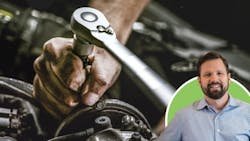I lot of owners say to me, "Aaron, I'm just trying to get more high-hour turning technicians. I want technicians who can crank out the hours. How do I get better technicians? How do I get my technicians to turn more hours?" It's always hours, hours, hours; tech, tech, techs. Technicians are only a small part of it. What allows a shop to turn more hours is the efficiency of the system. How long does it take a car to get from the front to the back and from the back to the front, get quoted, sold to the customer, get the part ordered, sent back to the technician to get fixed, and back up front where the customer is told it's done, and the car paid for and picked up? For a technician to turn so many hours, you have to have an amazing service advisor that can sell, somebody handling parts who knows what they're doing, other technicians who are not slowing that technician down with tons of questions and a great clientele that can afford your repairs. Topping that off can you as an owner—afford to market in slow times to keep that technician turning hours? Then you’ve got to do all the pluses. You have to have A/C. You have to have heat. You need a nice floor and good lighting. Every technician needs a computer. A great technician is more productive for reasons other than their own ability.
Great Systems Keep Techs at Home
You need to realize that in a normal market, every technician you have gets an offer from another shop every 60 days on average. If we think through that, we come to a couple of conclusions: 1) The longer they're with you, the fewer offers they get because the fewer cell phone numbers they have of other technicians who are giving their cell phone numbers out. 2) As that technician stays with you longer, for someone to steal that technician from you, someone must offer your technician more money, a lot more money. So, you might be paying him $38 an hour and a competing shop goes and offers your tech $50 an hour. Now, your technician might take that but let's say your technician is a high-hour turner and they’re turning 300 hours a month. They’re going to stop and think, " I'm doing 300 hours a month. I'm making 38 bucks an hour, that's $12,000 a month, $140-something thousand a year. The other guy’s offering me $12 more an hour, and if I could still turn 300 hours a month, that's 15-grand-plus a month. But what if I get there and the new shop can't sell? What if they have a horrible reputation? What if the owner doesn't market during slow times? What if I'm handcuffed with a poor team?” It’s more than just money. So, you need to make sure you understand that if your shop is operating at a certain efficiency that allows the technician better workflow, even though they’re being paid a lower hourly rate, you'll keep your technician because it's about the systems and the people, not just the money.
It All Starts with Talent
Higher efficiency means all shop positions must be filled by talented people. In my shop, I have eagles flying with eagles. I don't have eagles flying with ducks. I don't have high performers in the back of the house and low performers up front or high performers up front and low performers in the back. It takes a whole team. And at the end of the day, if you don't understand that it's all the pieces around the technician that allows him to turn more hours, you're missing the boat. There are technicians working with you right now that if they came to work for me would turn 20% more hours just because the system is easier. It’s that big a deal. Now that's not all of you reading this but most would agree it's most of the shops out there. So how can you adjust to create a more high-performance environment? The answers are out there, dig until you find them. Your shop depends on it!
About the Author

Aaron Stokes
A nearly 20-year veteran of the automotive repair industry, Aaron Stokes grew his business, AutoFix, from a one-car garage to a six-shop operation that is widely regarded as one of the top repair businesses in the country. Stokes, the founder of Shop Fix Academy, is an operational guru with a unique business and leadership philosophy that has led his business to great heights.
